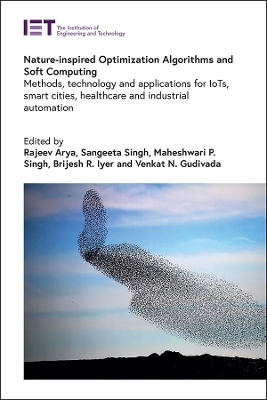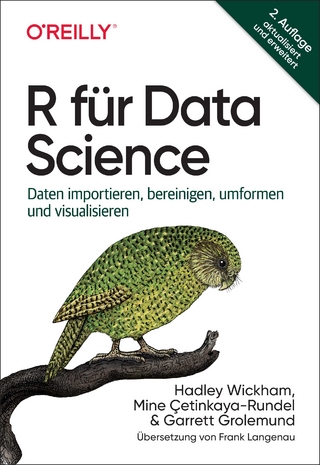
Nature-inspired Optimization Algorithms and Soft Computing
Institution of Engineering and Technology (Verlag)
978-1-83953-516-1 (ISBN)
We have witnessed an explosion of research activity around nature-inspired computing and bio-inspired optimization techniques, which can provide powerful tools for solving learning problems and data analysis in very large data sets. To design and implement optimization algorithms, several methods are used that bring superior performance. However, in some applications, the search space increases exponentially with the problem size. To overcome these limitations and to solve efficiently large scale combinatorial and highly nonlinear optimization problems, more flexible and adaptable algorithms are necessary.
Nature-inspired computing is oriented towards the application of outstanding information-processing aptitudes of the natural realm to the computational domain. The discipline of nature-inspired optimization algorithms is a major field of computational intelligence, soft computing and optimization. Metaheuristic search algorithms with population-based frameworks are capable of handling optimization in high-dimensional real-world problems for several domains including imaging, IoT, smart manufacturing, and healthcare. The integration of intelligence with smart technology enhances accuracy and efficiency. Smart devices and systems are revolutionizing the world by linking innovative thinking with innovative action and innovative implementation.
The aim of this edited book is to review the intertwining disciplines of nature-inspired computing and bio-inspired soft-computing (BISC) and their applications to real world challenges. The contributors cover the interaction between metaheuristics, such as evolutionary algorithms and swarm intelligence, with complex systems. They explain how to better handle different kinds of uncertainties in real-life problems using state-of-art of machine learning algorithms. They also explore future research perspectives to bridge the gap between theory and real-life day-to-day challenges for diverse domains of engineering.
The book will offer valuable insights to researchers and scientists from academia and industry in ICTs, IT and computer science, data science, AI and machine learning, swarm intelligence and complex systems. It is also a useful resource for professionals in related fields, and for advanced students with an interest in optimization and IoT applications.
Rajeev Arya is an assistant professor in the Department of Electronics and Communication Engineering at the National Institute of Technology, Patna, India. His research interests cover the fields of wireless communication and security issues, device-to-device communication based IoT System, UAV communications in 5G and beyond networks, soft computing techniques and applications. He has published in international journals and conferences. He is a member of IEI, IEEE ISRD-, and IAENG. He received his Ph.D. degree in Communication Engineering from the Indian Institute of Technology (IIT Roorkee), India. Sangeeta Singh is an assistant professor in the Department of Electronics and Communication Engineering at the National Institute of Technology, Patna, India. Her research interests include soft computing techniques and applications and beyond CMOS Devices Green Electronics steep switching transistors. She has actively participated in technical courses, workshops, and seminars at the NITs. She is a member of IEEE and IEEE EDS Society. She received her Ph.D. degree in Electronics and Communication Engineering from PDPM-IIITDM Jabalpur, India. Maheshwari P. Singh is a professor in the Department of Computer Science and Engineering at NIT Patna, India. He has written and edited several research books. His research interests include machine learning and wireless sensor networks, fuzzy set, social media and security. He has actively participated in technical courses, workshops and seminars at the IITs and NITs. He is a member of IE (Fellow), ACM (Senior), IEEE (Senior), and ISTE (Life Member). He received his Ph.D. degree in Computer Science and Engineering from MNNIT Allahabad, India. Brijesh Iyer holds a Ph.D. degree in Electronics and Telecommunication Engineering from Indian Institute of Technology, Roorkee, India. He is presently a senior faculty member in the Department of E&TC Engineering, Dr Babasaheb Ambedkar Technological University, India (a state technological University of Maharashtra-India). His research interests include RF front end design for 5G and beyond, IoT, biomedical imaging and signal processing. He has two patents to his credit, has authored five books on cutting edge technologies, and published over 40 research papers in peer-reviewed journals and conference proceedings. He has served as a program committee member of various international conferences. He is a member of IEEE MTTS, ISTE, IEANG, and IETE. Venkat N. Gudivada is the chairperson of and a professor in the Computer Science Department at East Carolina University, USA. His research has been funded by NSF, NASA, U.S. Department of Energy, US Department of Navy, US Army Research Office, Marshall University Foundation, and West Virginia Division of Science and Research. His research interests include cognitive computing, computational linguistics/NLP, information retrieval, automated question generation, data management and NoSQL systems, and personalization of learning. He has published over 110 articles in peer reviewed journals, book chapters, and conference proceedings. He is an IEEE Senior Member, and member of IARIA) and the Honor Society of Phi Kappa Phi. He received his PhD degree in Computer Science from the University of Louisiana - Lafayette, Louisiana, The USA.
Chapter 1: Introduction to various optimization techniques
Chapter 2: Nature-inspired optimization algorithm: an in-depth view
Chapter 3: Application aspects of nature-inspired optimization algorithms
Chapter 4: Particle swarm optimization applications and implications
Chapter 5: Advanced optimization by nature-inspired algorithm
Chapter 6: Application and challenges of optimization in Internet of Things (IoT)
Chapter 7: Optimization applications and implications in biomedicines and healthcare
Chapter 8: Applications and challenges of optimization in industrial automation
Chapter 9: Expectations from modern evolutionary approaches for image processing
Chapter 10: Conclusion
| Erscheinungsdatum | 30.09.2023 |
|---|---|
| Reihe/Serie | Computing and Networks |
| Verlagsort | Stevenage |
| Sprache | englisch |
| Maße | 156 x 234 mm |
| Themenwelt | Informatik ► Datenbanken ► Data Warehouse / Data Mining |
| Mathematik / Informatik ► Mathematik ► Angewandte Mathematik | |
| Mathematik / Informatik ► Mathematik ► Finanz- / Wirtschaftsmathematik | |
| ISBN-10 | 1-83953-516-4 / 1839535164 |
| ISBN-13 | 978-1-83953-516-1 / 9781839535161 |
| Zustand | Neuware |
| Informationen gemäß Produktsicherheitsverordnung (GPSR) | |
| Haben Sie eine Frage zum Produkt? |
aus dem Bereich


